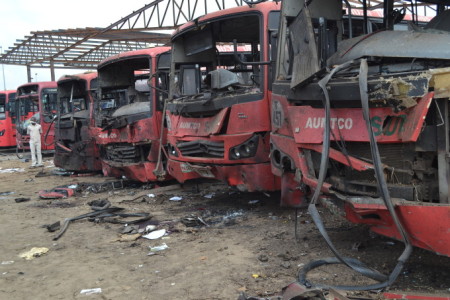
A resident who spoke to Human Rights Watch said that when herdsmen set their town on fire, his brother was asleep and died in their burning house.
Escalating violence across five states in central Nigeria has killed more than 1,000 people since December 2013, Human Rights Watch, HRW, said on Tuesday.
The HRW, in a report made available to PREMIUM TIMES, also said the failure of Nigerian authorities to investigate the attacks or bring those responsible to justice is likely to exacerbate the cycle of violence in the conflict-prone north central region, which includes Plateau, Benue, Nasarawa, Kaduna, and Taraba.
Communal violence, stoked by competition between local farming communities and nomadic herdsmen, has plagued the region for many years and is spreading to other states in northern Nigeria.
“The lack of justice for years of violence resulting from inter-communal tensions has created a combustible situation,” said Daniel Bekele, Africa director at Human Rights Watch. “The government needs to ensure full criminal investigations and provide justice for the victims and their families.”
Adding to the overall tension in the central region, a bomb explosion on Monday killed more than 71 people and injured hundreds of others in Nyanya, the suburbs of Abuja, the Nigerian capital.
The attack, which occurred during an early morning peak period and at a usually crowded commuter motor park, appeared aimed at achieving a high casualty. Nyanya borders Nasarawa State, one of the states affected by communal violence, though Monday’s explosion did not immediately seem to be connected to those conflicts.
Apart from the estimated 1,000 killed, thousands of others have been displaced in the violence in the north central region.
Human Rights Watch said it spoke to scores of displaced residents of affected communities camped at six locations in Makurdi, the capital of Benue, one of the affected states. Other northern states, to which the violence is spreading, include Zamfara and Katsina.
In a December 2013 report titled, “‘Leave Everything to God’: Accountability for Inter-Communal Violence in Plateau and Kaduna States, Nigeria,” Human Rights Watch analyzed the pattern of violence that has engulfed two states in central Nigeria since 2010. The report documented how the lack of accountability for communal violence and mass murder led to preventable cycles of violence and reprisal killings in those states.
The main causes of the violence appear to include struggles around livelihood and identity, particularly between sedentary farmers and nomadic pastoralists over access to grazing lands. An activist working on peace initiatives in the north central states told Human Rights Watch that some affected state governments were failing to impartially protect residents, siding with one group against the other. In other cases, the advocate said, state governments were using force to restore peace, but, instead of quelling violence, seemed to exacerbate it.
Since mid-December, accusations of attacks by herdsmen against farmers in rural parts of Kaduna and Plateau states have intensified. On January 6, 2014, armed men described by residents as herdsmen attacked Bachit and Shonong communities in Riyom in Plateau State and killed an estimated 36 people. Attacks on Wase and Barkin Ladi communities in Plateau State killed 22 and 13 people respectively. In Kaura, part of Kaduna State, early morning raids by unidentified gunmen on February 3 and March 15 left 30 and 100 people dead respectively.
On April 2, Nigerian media reported that soldiers in the southern Kaduna town of Kafanchan killed two young men who were part of a group of youth protesting perceived unfairness in the justice system. The demonstrators had been protesting based on fears of the release of a group of men who had allegedly been arrested at a military checkpoint with a truckload of weapons. The killings of the two youth set off widespread violence in the town.
Benue State, with a majority agrarian population, has had some of the worst attacks, in Logo, Guma, Gwer West, Gwer East, and Agatu local government areas, where more than 321 people have been killed since early March. In a March 28 attack on several villages in Agatu, gunmen killed 19 people and abducted 15 others, including women and children.
On March 25, gunmen killed more than 60 people in their beds in an early morning attack in Agena in Ikpayongo district of Gwer East local government area.
A resident who spoke to Human Rights Watch said that when herdsmen set their town on fire, his brother was asleep and died in their burning house.
Posted by , Published at 11:23 PM and have








